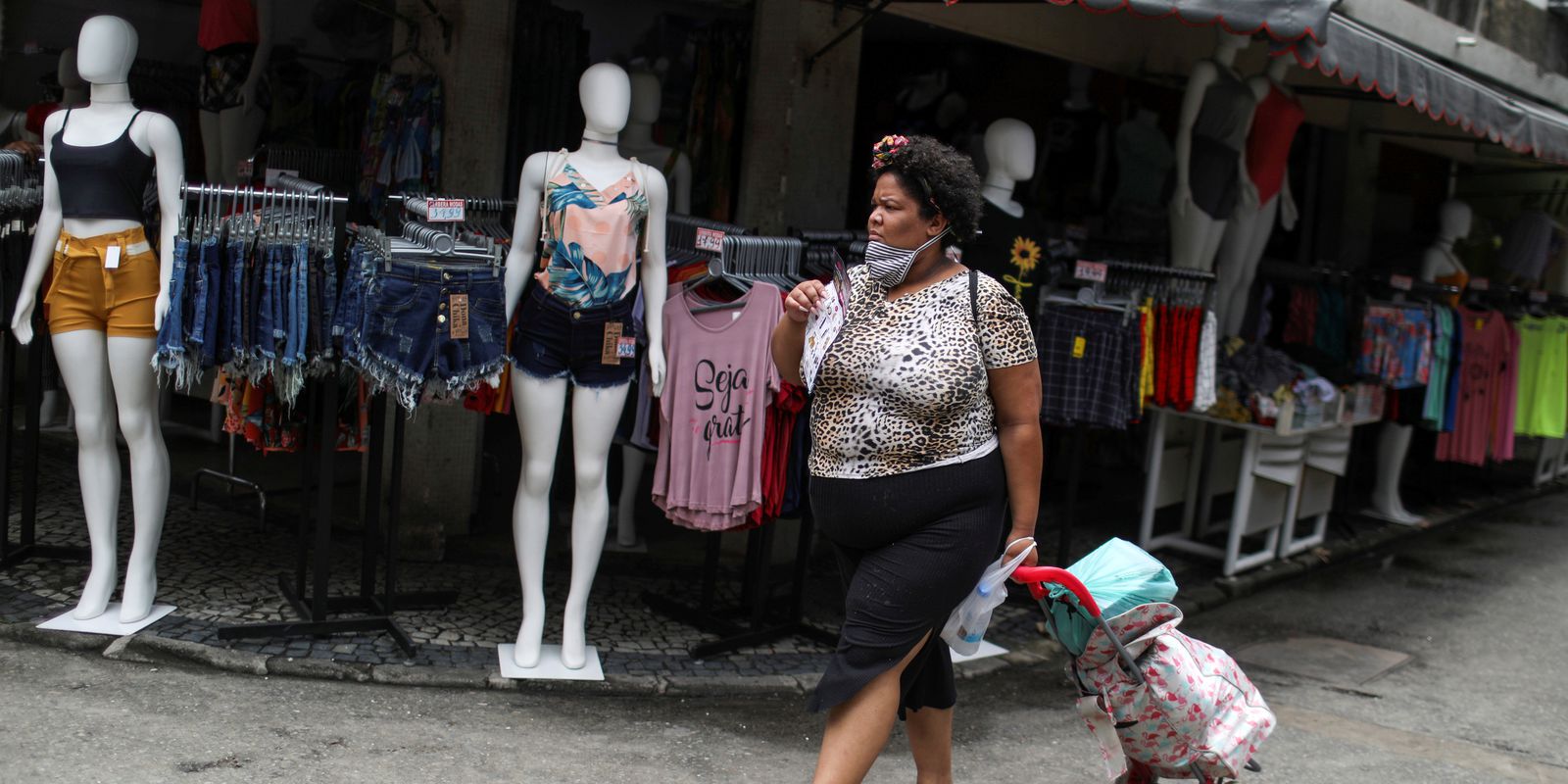The Business Entrepreneurs’ Confidence Index (ICEC) for August, released today (25) by the National Confederation of Commerce in Goods, Services and Tourism (CNC), reached 124 points, showing a drop of 1.8% in relation to July, compared to seasonally adjusted. According to CNC, this was the first drop in optimism from Brazilian retailers since March. In comparison with August of last year, however, the level of confidence of traders rose 7.8%.
Speaking to Agência Brasil, CNC economist Izis Ferreira clarified that this increase in optimism in the annual comparison reveals the effect of the resumption of the flow of people on the streets and in commerce. “The second half of last year saw a significant improvement in trade activity. But the base was still very low compared to the second half of 2020.”
The positive effect of the retail recovery, which began in the second half of last year, has been consolidating throughout the year. “There was no worsening in the pandemic scenario, there was no need for new restrictions, vaccination coverage was increasing and, then, commerce began to feel this benefit, so to speak, of the resumption, of the flow of people on the streets, seeking to be more in the spaces commercial and this was reflected in the annual comparison”.
Risks and uncertainties
In the transition from July to August of this year, however, there was a moderation in the confidence of retailers caused by the increase in risks and uncertainties, both in Brazil and abroad. “The commerce is very sorry that this translates in many ways”, he commented.
The CNC survey points out that the assessment of current conditions in terms of expectations for the coming months dropped 2.3% and 2.4%, respectively, in August. Merchants’ perspectives for the short-term performance of the economy also had the greatest decrease among the nine items evaluated (-3.1%). Retailers are still betting on a 2.8% retraction for the current performance of trade, following the decline in sales pointed out by the Brazilian Institute of Geography and Statistics (IBGE) in June (-2.3%). Of the 10 segments evaluated in expanded retail, nine had a retraction, except for sales of pharmacies and perfumeries, which increased by 1.3%.
perspectives
The CNC economist also highlighted that the commerce sector is suffering the effects of the current electoral calendar. “Historically, every year of general elections there is a moderation in confidence, which is accentuated as the electoral process goes on”.
Analyzing the months of August of recent years in which there were general elections, it appears that two to three months before the vote, the confidence index and expectations fall. In August of this year, however, expectations of what the trader expects for the six months ahead were higher, totaling 153 points, against 144.9 points in August 2018 and 142.4 points in August 2014. “The level of expectations for the performance of commerce are a little above those months of August of years in which there were general elections because the government took some measures that, in fact, are already supporting the income of families”, explained Izis Ferreira.
Inflation and indebtedness
The CNC economist indicated that this will have a positive impact on trade, but it will be smaller due to the current scenario of high inflation, especially for middle and low-income families, and on items that weigh the most on the budget, such as: food and expenses. with health and housing. These items and expenses are still at very high price levels. “We’re not seeing food prices fall as fast as general inflation.”
According to Izis, the reduction in general inflation is explained by the drop in fuel prices. “This means that it is an inflation that is still challenging middle and low-income consumers. As much as it is being irrigated by resources from Auxílio Brasil, or as much as other resources have helped in the income of these families, such as the extraordinary release of the Severance Indemnity Fund (FGTS), we still have this challenge and has a highly indebted consumer, with more than one type of debt. This makes it more difficult for him to increase his consumption in the face of a scenario of high inflation and indebtedness”.
According to Izis Ferreira, the impact of the measures to raise income will be moderate in the face of the situation, which will still challenge consumers in matters of inflation and indebtedness. With this, the trader also moderated or reduced his intention to invest. She believes that this scenario should remain in the next two months, with the retailer being more cautious, holding back the investment decision and hiring staff a little. On the other hand, she pointed out that at the end of the year, once the electoral calendar is over and influenced by events such as Black Friday, the World Cup and Christmas, commercial expectations can be revised.
Regions
In all Brazilian regions, expectations for the performance of trade showed a reduction in August. This happened for the last time between March and April 2021, when the country was going through the second wave of covid-19.
The ICEC of August reveals that although the expectations of traders in the North Region present the highest level (165.8 points), the indicator had the biggest drop in the regional comparison (-3.3%). The reduction in the expectations of shopkeepers in the North for the coming months was observed even though this is the region where the highest average amounts paid by Auxílio Brasil were recorded, compared to other regions, according to data from the Ministry of Citizenship, in the order of R$ 445.
The second biggest drop in the outlook for commerce was registered among entrepreneurs in the Southeast Region (-3%), despite the fact that the region encompasses three of the five states with the highest number of families benefiting from the current income transfer program (São Paulo, Rio de Janeiro and Minas Gerais).
*Article changed at 16:29 to clarify the title.














